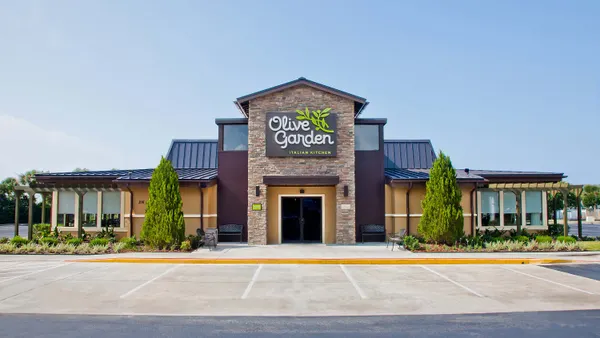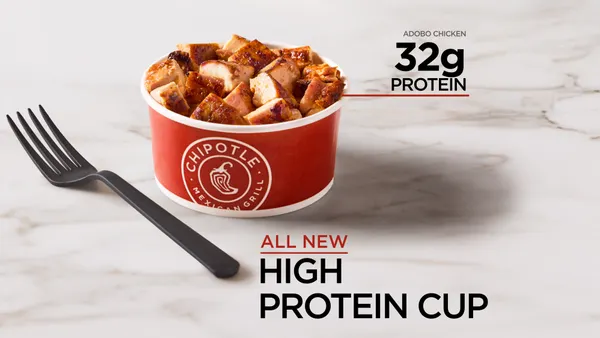Dive Brief:
- JUST has partnered with Japanese meat producer Toriyama and its export agent, Awano Food Group, to grow, distribute and sell wagyu beef worldwide, according to a company statement. JUST will grow the renowned beef from Toriyama cell lines in its clean meat labs. Awano will then market and sell it.
- Through the partnership, JUST plans to make the exclusive beef available to more restaurants and at more price points, according to the statement. The agreement was signed a few weeks ago, JUST spokesman Andrew Noyes told Food Dive in an email, so the partnership is still in the very early stages and the end product is a long way from getting to market.
- "For decades, the Toriyama family has paired science and skill with a passion for achieving a superior flavor for all the meat they produce," JUST CEO Josh Tetrick said in the statement. "Precious few have had the chance to experience umami Wagyu, and we hope this partnership allows more restaurants to share Toriyama beef and its story in a new, exciting way."
Dive Insight:
With this agreement, JUST has changed the argument for lab-grown meat from one about sustainability to one about possibility. While beef and dairy production causes significant greenhouse gas emissions and creating those products in the lab can help meet global demand more sustainably, this deal plays up the cool factor of what cultured meat technology can do. And regardless of the environmental impact, anything that could bring a treasured culinary ingredient to more people for less money is bound to pique consumer interest.
Wagyu beef comes from specific Japanese cattle breeds and is subject to strict regulations governing its bloodline and how it is reared and fed. The meat is prized for its marbled appearance and umami taste. It is exclusive and expensive, retailing for hundreds of dollars, and sometimes even more. These are the kinds of steaks that are known to gourmets worldwide, but are financially out of reach to most.
Until now, the conversation about cultured meat has been about much more common products available in any grocery store — chicken, ground beef and lamb. Arguments have been about who will regulate it, and even whether it should actually be called "meat." And then, once products are available at market, whether consumers will choose what was grown in the lab versus what was produced conventionally.
When this JUST product is available to the public, consumers won't talk about these issues. What they are more likely to be interested in is the fact that there is wagyu beef available on the menu. The reputation and exclusivity of the product makes it much more probable that other consumer concerns are diminished.
This agreement does the equivalent of shooting for the moon and bringing it within reach. And it highlights a fact about this technology that often gets lost in today's debate. By growing meat in the lab, there are really neat things that can be done. Some of the most exclusive meat in the world could one day be as common on menus and in grocery stores as filet mignon.
JUST has plugged its technology into the dreams of foodies around the world. And while the company is also working on less marquee products — the company has plans to bring cell cultured chicken to some high-end restaurant menus (likely outside the United States) as soon as this year — this agreement shows JUST is already working on the next big thing in cultured meat.
Toriyama, which is a family-owned company that has produced wagyu beef for generations, said in a statement that working with JUST seems to be the next logical step in its quest to improve.
"Our embrace of science and technology has allowed us to produce unparalleled umami beef and the kind of technology developed by JUST has the potential to bring about a fascinating new era oif more sustainable meat production," Makoto Toriyama, the company's CEO, said in a statement.
This agreement doesn't mean it will be an easy path to mass producing wagyu beef in the lab. Growing cells that mimic the way an animal's muscle grows — marbling and all — is a distinct challenge for all of the companies working in the space. Since wagyu beef is so distinctly marbled, it will be that much more of a challenge to replicate.
In addition, while Toriyama's cattle have a distinct biological pedigree back at least three generations, the life the cows live also factors deeply into the taste and texture of the meat. Toriyama's cattle are raised at a high altitude in "impeccable living conditions," according to the release — some of which includes daily brushing. JUST also will be tasked with making sure its meat tastes like what comes from the pampered cows.
Still, challenges aside, the agreement gives foodies something to look forward to — and reminds all consumers that there are fun possibilities in the lab grown meat space. Maybe this will inspire more intriguing partnerships — or spur companies to develop interesting species and varieties of meat to grow.










